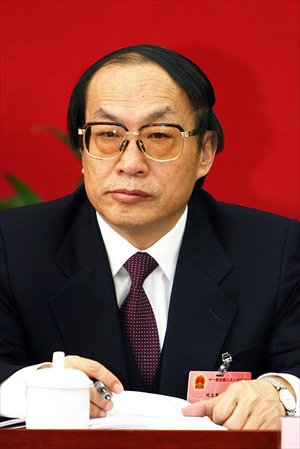Ex-railway minister charged

Liu Zhijun, the former minister of railways, was charged with bribe-taking and abuse of power on Wednesday, more than two years after the controversial figure was removed from his post.
The Second Branch of the Beijing People's Procuratorate Wednesday filed the charges against Liu with the Beijing Second Intermediate People's Court. The court has accepted the case and will set a trial date, the Xinhua News Agency reported.
Liu, 60, had been under investigation for serious disciplinary violations since February 2011, when he was dismissed from the post. He was stripped of his Communist Party of China membership in May 2012.
According to the indictment issued by the procuratorate, as a state functionary, Liu sought benefits for others by taking advantage of his position, and accepted financial incentives from others, which were of a huge amount.
The former official worked in the railway sector for nearly four decades, and became railways minister in 2003.
Wang Mengshu, a railways expert and member of the Chinese Academy of Engineering, told the Global Times that starting as a railways maintenance worker, Liu rose to the post of railways minister through his capability and boldness, and was famous for his devotion to work.
Zhao Jian, a professor with the School of Economics and Management at Beijing Jiaotong University, also corroborated that. "I heard from sources that he worked day and night, and was exceptionally hard working. Of course, that was due to his political ambition," said Zhao.
According to the China Times, Liu always rode on trial trains regardless of potential risks, sat in the train cab to watch the drivers as they were working and appeared at rail stations without company.
During Liu's reign, the country's railway sector carried out two projects to boost train speeds in 2004 and 2007, and ambitiously pushed forward large-scale development of the high-speed rail network.
Liu repeatedly advocated "leapfrog development" of the rail sector, and poured massive investment into building the network.
Wang said people in the railway sector called Liu a "lunatic" behind his back, and it was his "lunatic behavior" that pushed the breakneck development of the high-speed rail network.
However, the "leapfrog development" of the high-speed rail network also brought massive debt to the railways ministry, and caused a series of corruption and safety concerns.
In July 2011, a deadly train collision led to 40 deaths. In December 2011, the State Council announced that Liu was responsible for the accident.
Zhao, who had repeatedly voiced opposition to Liu's development of the high-speed rail network in public, said the former official tried to talk him into giving up his opposition. "He can't tolerate dissenting views," Zhao said.
Zhao noted it was the ministry's centralized control of railway resources and its mixed role in administrative and commercial activities that provided the conditions for Liu's corruption.
It was reported that the central authority planned to dismantle the railways ministry in 2008. Wang said Liu and other officials lobbied the central authority not to carry out the plan, citing national security concerns.
Last month, the railways ministry was dismantled into administrative and commercial arms in a bid to reduce bureaucracy and improve railway service efficiency.
The 21st Century Business Herald Wednesday quoted insiders as saying that the newly established National Railway Bureau would only keep 130 staff members on its official payroll, moving nearly 800 staff members of the former railways ministry to its commercial arms or local branches by June.
Zhao said the separation of government functions from enterprise management was only the first step in a much-needed reform process.
"If the sector can't break the monopoly and introduce competition, it will only be a very limited reform and form another monopolized enterprise in the country," he said.